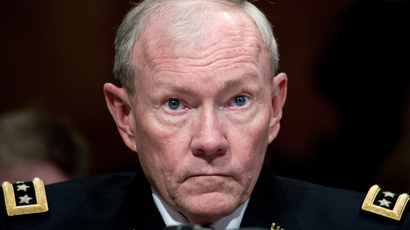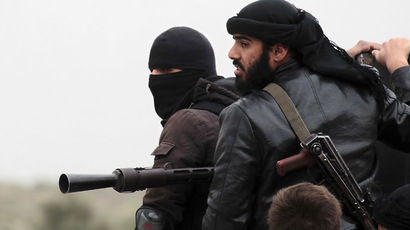Syrian rebels press US to send weapons fast, Kerry sees no military solution to crisis
Syrian opposition leaders on their three-day visit to the US have urged Washington to get a move on with sending promised arms to the rebels. John Kerry has declared there’s no military solution to the crisis.
A delegation representing the Syrian National Coalition, headed
by its newly-elected leader Ahmed Jarba, met with John Kerry on
Thursday at the US mission to the United Nations in New York. The
statement Jarba issued following the closed-door talks described
the situation in Syria as “desperate” and urged the US to
start delivering on its military aid promise as soon as possible.
"The US commitment of military support to the Supreme Military
Council is vital, but it needs to happen fast, and in a way that
allows us to defend ourselves and protect civilians," Jarba
said.
The House and Senate Intelligence Committees have recently given
a green light to arm Syrian rebels, declaring they had their
concerns alleviated. Not fully though, as can be seen from a
comment made by Dutch Ruppersberger, the top Democrat on the
House of Representatives Intelligence Committee.
"One of our main issues is to make sure that, whatever we do,
that nothing gets in the hands of Al Qaeda," said
Ruppersberger, as cited by Reuters.
The task is impossible to fulfill, according to political science
academic Dr. Colin Cavell, who spoke to RT.
“Anybody who sends arms to the Syrian opposition, they know
that it’s going to support the jihadists. When you go ahead and
violate international law and support opposition fighters in a
country in attempt to overthrow it, then you are declaring
yourself at odds and at war with that country. The United States
along with Saudi Arabia and the Gulf monarchs have declared
themselves at war with Syria… We’ve just gone through two
terribly expensive wars and lost thousands of American soldiers,
and now we’ve got Barack Obama and John Kerry trying to get
us into a third war,” Cavell said.

Even if the US does start supplying arms to the Syrian rebel
forces, it might be for a short term only. Funding for the
program will cease with the end of the US fiscal year, which
is September 30. The US Congress will then have to approve
the plan once again, which would mean a new round of bitter
debate among the lawmakers.
Despite the congressional approval of weapons supplies, John
Kerry was cautious speaking of the Syrian crisis on Thursday,
pledging commitment to its peaceful settlement.
“There is no military solution to Syria. There is only a
political solution, and that will require leadership in order to
bring people to the table,” John Kerry said.
Russia and the US bringing to the Syrian government and the
opposition the negotiating table is something the two countries
have been trying to do for quite some time, despite their
differences on the crisis. In May Secretary Kerry and Foreign
Minister Lavrov announced their joint initiative to organize a
peace conference in Geneva. Dubbed ‘Geneva II’, the conference is
a follow-up to last year’s international meeting in the Swiss
city, where a peace roadmap for Syria was drafted.
Prospects for Geneva II
The Syrian National Coalition’s visit to New York is part of Washington’s efforts to encourage opposition forces sit down for talks. That possibility was tested at an informal meeting which Jarba and his three colleagues had with the 15-member UN Security Council on Friday.
The meeting was not a sign of the UN official recognition of the
Syrian National Coalition, Russia’s UN envoy Vitaly Churkin
warned.

After the meeting, however, Churkin did admit that some progress was reached.
"I think this was a useful meeting, but there are still obstacles that need to be overcome for the Geneva-2 conference to take place,” the envoy said, citing disagreements within the opposition camp.
"We talked with the opposition leaders. I pointed to a number of problems existing in the opposition ranks. I expressed my concerns about the fact that various opposition groups have been using terrorist methods increasingly more often," he said.
“Still, I think there are good chances for the conference to convene, because the alternatives are too horrifying,” Churkin added.
The roadmap for the much-delayed Geneva-2 talks is being drawn from the internationally-agreed upon Communique from last year’s meeting, despite a lot of debate focusing on the differing interpretation of one of its clauses.
“The transitional government…could include members of the present government and the opposition and other groups and shall be formed on the basis of mutual consent,” the document reads.
However, because the opposition will only concede to mutual consent with Assad absent from the negotiating table, Churkin sees more difficulties arising.
“This interpretation of one of the clauses is one of the pre-conditions. The opposition want a certain interpretation to be established before going to the talks,” said the envoy, adding that time was being “wasted.”
“There is a Communique. If you want to implement it, just go to the negotiating table,” Churkin said.
Some other conditions put forth by the opposition at the Friday meeting included a call for the cessation of the use of heavy and chemical weapons – the latter being something which both sides continue to accuse each other of using.
The opposition group is yet to prove its legitimacy and to
respond to some critical voices questioning its status, according
to RT’s Marina Portnaya, reporting from New York.
“Critics say the group has no official power and lacks support
and recognition inside Syria. The Syrian National Coalition was
founded in Doha and is based in Istanbul. Some see this group as
outsiders lobbying for more arms to import into Syria’s
already-bloody civil war,” Portnaya said.
John Kerry seems not to be one of those skeptics, sounding quite
optimistic following his Thursday meeting with the leadership of
the Syrian National Coalition.
"The Syrian opposition committed that they believed Geneva II
is very important and they agreed to work over the course of the
next couple of weeks to pinpoint the terms, the conditions under
which they think it could work," he said.
Conditions and terms put forward by the opposition are however
exactly what hampered peace talks in the past, as some of them
are hardly realistic, such as the current Syrian President’s
giving up his power.
"In principle nobody is against Geneva II, but we cannot enter into talks while the regime continues to kill hundreds every day and use arms of mass destruction," said Burhan Ghalioun, a senior coalition member who was in the delegation, as cited by AFP.
The Syrian government in turn describes the rebels as terrorists
and blames the US for double standards.
"Washington's decision to arm the terrorist groups in Syria
proves that the United States [wants to] exacerbate the crisis in
Syria, and shows up its dishonesty in the search for a political
solution at a [proposed peace] conference in Geneva," a
Syrian Foreign Ministry official said in a statement.
UN Secretary-General Ban Ki Moon has called on both sides of the
conflict to halt the violence which has raged since the start of
the unrest in March 2011 resulting in more than 100,000 deaths.
"Military and violent actions must be stopped by both parties,
and it is thus imperative to have a peace conference in Geneva as
soon as possible, as was initiated by Secretary Kerry and Russian
Foreign Minister Lavrov," Ban said.














